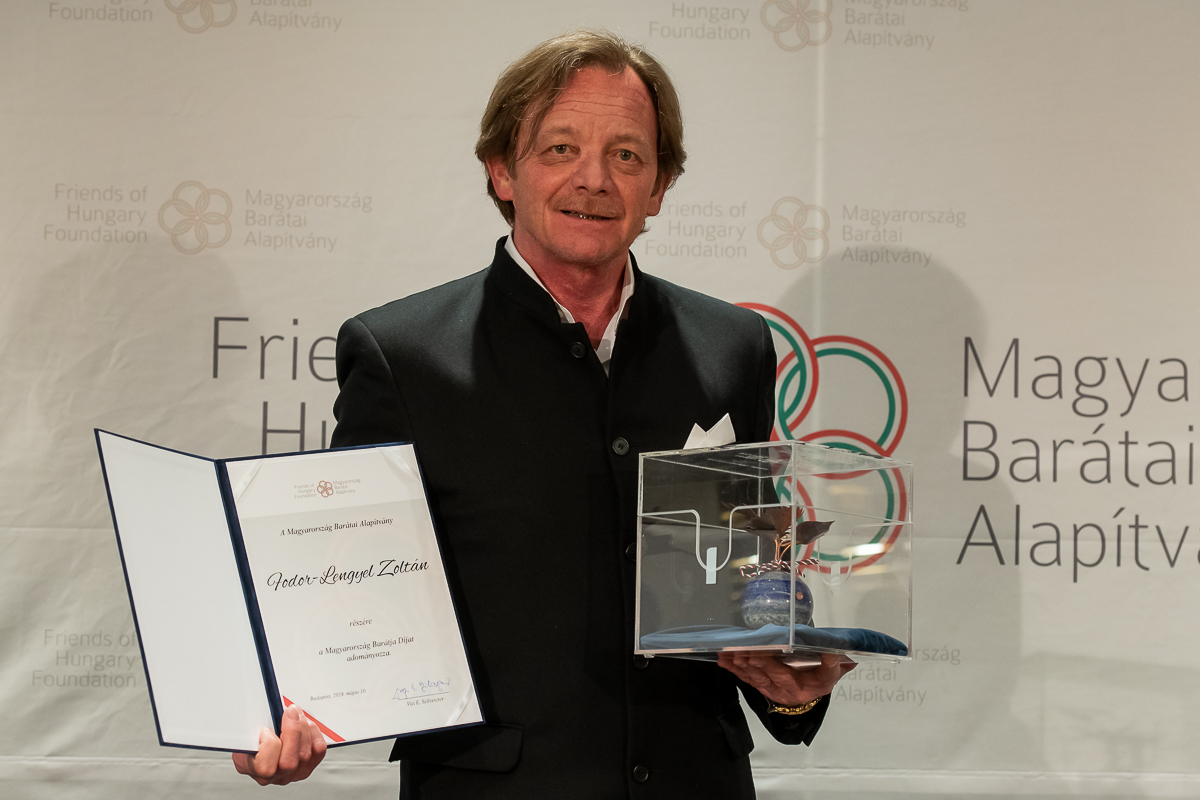
The artist received the Friends of Hungary Award for his contribution to Hungarian culture.Continue reading
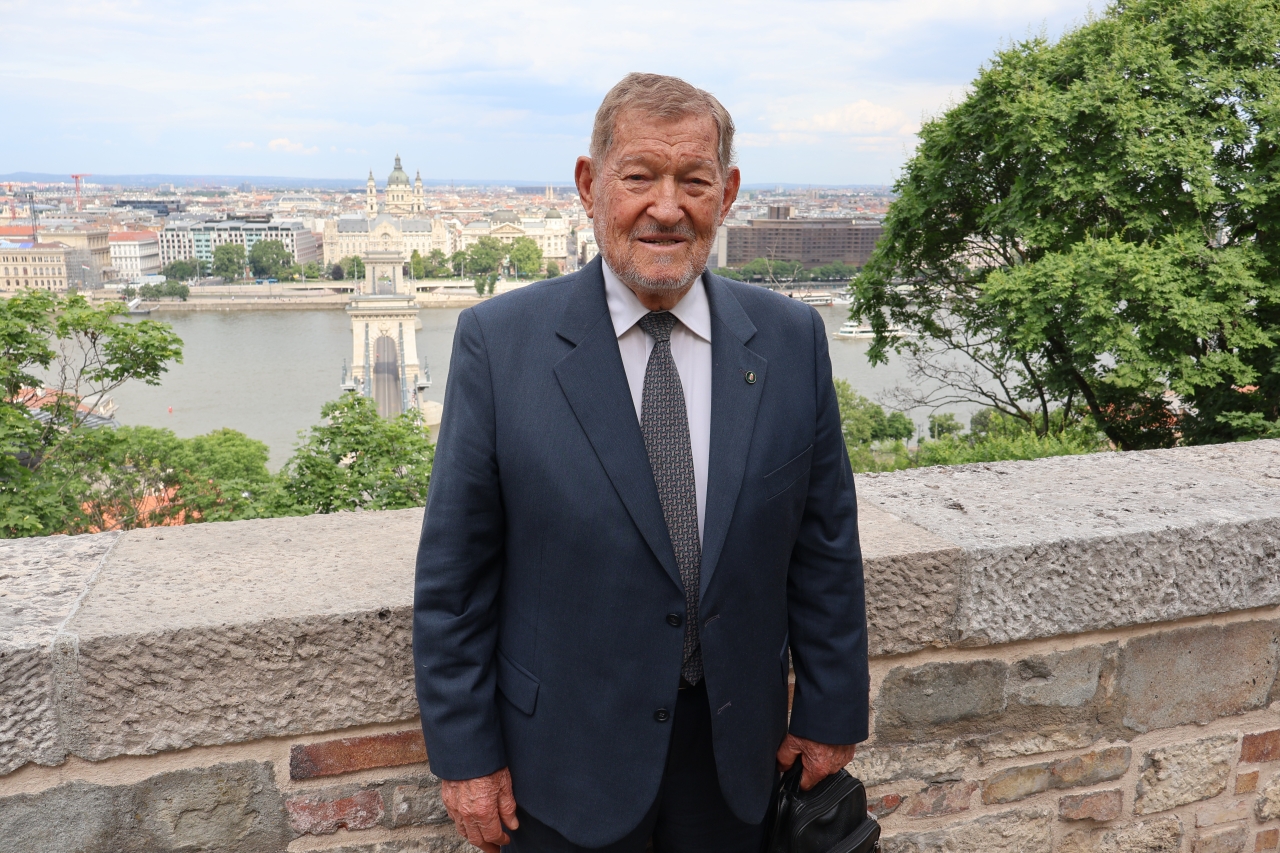
Footballer, revolutionary, emigrant, Real Madrid coach and scout, member of the Friends of Hungary Foundation, and much more can be associated with József Tóth-Zele, after whom a soccer academy was named in his mother’s home village of Gesztely. We asked the Real Madrid legend about his life, today’s Champions League final, the Hungarian national team and the future of Hungarian soccer.
Can you tell us a bit about yourself? How did a boy from Füzesabony end up at Atletico Madrid as a footballer after a detour in Austria and France and then become a coach at Real Madrid after his active soccer career?
That is a long story, so I will try to keep it short and sweet. I come from Füzesabony. As a student, I attended the Dobó István High School in Eger. I played soccer there, but the truth is that I did not want to become a footballer. I could have studied after finishing school, but I decided against it and went to work in Heves. Here I started my soccer career as an adult in a third division team.
When I heard about the outbreak of the revolution on the radio (the 1956 revolution – editor’s note), I thought I would travel from Heves to Budapest to see what was happening in the capital. I got off at the Keleti station, where the revolutionaries were looking for drivers who had a license to drive a truck. I had one. So I was immediately sent to Transdanubia to bring food to the revolutionary youth. That is how I came into contact with the revolutionaries. The only difference between me and them was that I had not studied, we thought about the world in the same way. The next day I took the truck to Szolnok, but on the way back a sniper shot my companion. I took the wounded man to Corvin Lane (Corvin-köz, a central place of the revolution in Budapest – editor’s note), where I met the leader of the youth group, Gergely Pongrátz, with whom – as luck would have it – I later met in Madrid.
Following my experiences in Budapest, I decided that I had had enough of the communists and communism. After the revolution was crushed, I fled to Austria on November 23. Here I had to decide what I wanted to do: To be a truck driver or a footballer. The second option was more promising. Unlike Ferenc Puskás, who wanted to be a footballer from a young age, I was a bit late and did not decide until I was 19.
I ended up in a refugee camp in Austria, where I met a Hungarian from Australia who wanted to organize a team for Hungarian footballers who had left the country at the time. He promised me a place in the 24-man “emigrant national team.” The team was to include Ferenc Puskás, Sándor Kocsis and Zoltán Czibor (footballers of the Hungarian Golden Team – editor’s note). But this plan came to nothing, Kocsis and Czibor were “taken” by Barcelona and Puskás by Real Madrid, so I fell by the wayside.
I decided to take the first opportunity that came my way as a footballer from the West, as I did not like the refugee camp. It was the French team from Grenoble who approached me first, and that is how I ended up in the south of France as a simple second division footballer. The club encouraged me to take French citizenship because I might even make the national team, but I did not want that. I spent 3 years in France, in Geroble, from where I was drawn to the French capital, where I played for Red Star Paris.
From there, it was an acquaintance from the refugee camp in Austria and not my playing style that brought me to my next club. A Hungarian friend of mine, Peter Ilku, who played for Atletico Madrid, was involved in a serious car accident. The club asked him who he would recommend as a replacement until he was healthy again. He suggested me. That is how I ended up at Atletico Madrid. I also met Gergely Pongrátz again in Madrid; we both studied politics at the university.
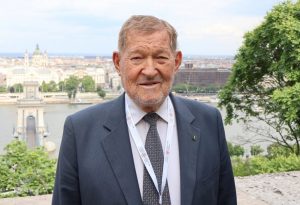
József Tóth-Zele in Budapest. (Photo: Hungary Today)
At the end of my active soccer career, I completed a coaching course at the Spanish Football Association together with Sándor Kocsis and Ferenc Puskás, which was led by the then captain of the Spanish national team, László Kubala. After the course, I coached youth players from Moscardo’s third division for free, with whom we also played matches against Real Madrid youth players. They usually beat everyone, but they drew twice with my team. José Santamaria asked me after the second game, after seeing my team’s performance, if I would join Real Madrid as coach the following year. Of course I said yes.
That is how I ended up at Real Madrid, where I worked as a youth coach and scout for 30 years. The team has to thank me for signing Emilio Butragueño, Míchel, Martín Vázquez, Miguel Pardeza and José Antonio Camacho, to name just a few of the big names. As for the current players, I also brought Álvaro Morata, Dani Carvajal and Hakimi to Madrid. That is why I was and am respected and appreciated at the club. The only reason I could not coach Real Madrid’s senior team was the Santiago Bernabéu’s policy that only former footballers of the club could be appointed to this position. But I had played for rivals Atletico Madrid.
I ended my career at Real Madrid. But I am still connected to the club and soccer. This year, I took the Real Madrid youth team to Hungary for the 16th Puskás Suzuki Cup (one of the most important international youth tournaments for U17 footballers in Europe – editor’s note) and they won the 2024 Cup.
It is fair to say that there are few people to whom Real Madrid owe as much professionally as you, who helped the team for decades as a youth coach and scout. What success of the club are you particularly proud of?
Many people tell me that when you win your tenth trophy, it is as valuable as your first. But that is not true. I am most proud of the very first trophy I won with the 17-year-old Real Madrid players. Of course, I am also proud of the footballers I brought into the team who went on to become great players, like Butragueño and the others, but the first trophy I won with my team, beating FC Barcelona, Athletic Bilbao and the others, is the one closest to my heart.
Are you in contact with former and current Real Madrid players and coaches? Do they meet each other?
I am of course in contact with the footballers I discovered. I have two former teams that I go to lunch with once a month, we talk and reminisce. I still have a good friendship with Camacho, for example, who is now president of Real Madrid’s senior team. I used to bring the Real Madrid seniors to Eger to play soccer and am currently in the process of organizing another visit to Eger in January. Butragueño, who is also a good friend of mine, even gave an interview for a movie about me.
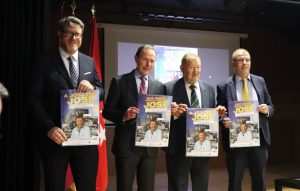
Nemzeti Sport editor-in-chief György Szöllősi, Emilio Butragueño, József Tóth-Zele and Dr. Barnabás Kovács (L-R) at the premiere of the film in Madrid (Photo: Facebook/ Embajada de Hungría en Madrid // Magyarország Nagykövetsége, Madrid. (Foto: Facebook/Embajada de Hungría en Madrid // Magyarország Nagykövetsége, Madrid)
Tonight is the Champions League final, where Dortmund will face Real Madrid. What do you expect from this match?
I do not think I would be a real ‘Madridista’ if I said Real Madrid will not win. Real Madrid is an exceptional team in the past, in the present and in the future. After 14 Champions League and 2 UEFA Cup victories, the team still holds the key to victory.
The European Football Championships will soon begin in Germany, for which the Hungarian national team, coached by Marco Rossi, has qualified unbeaten and top of its group. In terms of unbeatability, the team is following in the footsteps of the “Golden Team,” as the last team to have a comparable streak was the “Golden Team,” which won 15 of 18 games and drew three after losing the 1954 World Cup final. Can the two teams be compared? How do you rate the Hungarian national team’s chances at the European Championship?
First of all, I would like to congratulate Marco Rossi. I am very happy that the Hungarian national team has a coach who, although he has had no success in his own country (Italy – editor’s note), has achieved exceptional results with the Hungarian national team. I think it is right that he does not decide the composition of the team based on who plays where, but on the quality of the soccer that is played. The coach of our national team is brave enough to bring footballers who play in the second division abroad into the national team if he thinks they will perform well, and I congratulate him on that.
However, to compare the national team with the Golden Team is, in my opinion, out of the question and does not stand up. At that time, Hungarian soccer was by far the best in the world. If the Golden Team had been replaced by the second team, I think the Hungarians would still have beaten the world.
You have said about Real Madrid that it is a world team whose management tries to attract the best players. Do you think there is a Hungarian player who could fit in well with this team?
It pains me to say it, but there is not one at the moment. Hungarian captain Dominik Szoboszlai, who currently plays for Liverpool in England, is an excellent footballer, but he still has to prove himself and shine in the West before he can attract Real Madrid’s interest. As Real Madrid is a world team, it is not easy for young players who want to make it into the team.
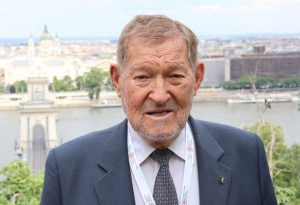
József Tóth-Zele (Photo: Hungary Today)
Soccer is becoming more and more popular in Hungary every year. What advice would you give coaches and young players for the future of Hungarian soccer?
The Hungarian league should be revitalized with Hungarian players. Hungarians love soccer, but they do not watch the Hungarian league, they prefer to follow foreign leagues because they say that Hungarian club soccer is not good enough. It would be important for Hungarian youngsters and Hungarian coaches to get opportunities in the first teams and not mainly foreigners.
If the counter-argument is that Hungarian players are not developing enough, then we need to think about what can be done, including with the help of experts, to bring Hungarian footballers back up to world level. In the sports in which Hungarians excelled in the 1950s – kayaking, swimming, water polo – they are still doing well today. The exception is soccer. It is time to revive soccer with Hungarian players. The Hungarian Football Federation has taken initiatives to promote playing opportunities for young Hungarians, but in my opinion more needs to be done.
We met for the first time at the Friends of Hungary Foundation conference. What do you think of the foundation’s activities?
First of all, congratulations on the 10th conference of the Foundation, I am honored to have participated in such a prestigious event. In my opinion, there is definitely a need for an organization that brings together Hungarians from all over the world who love their homeland and brings them home at least once a year. I thank the Friends of Hungary Foundation for their work.
Via Ungarn Heute, written by Enikő Enzsöl; Featured image: Hungary Today